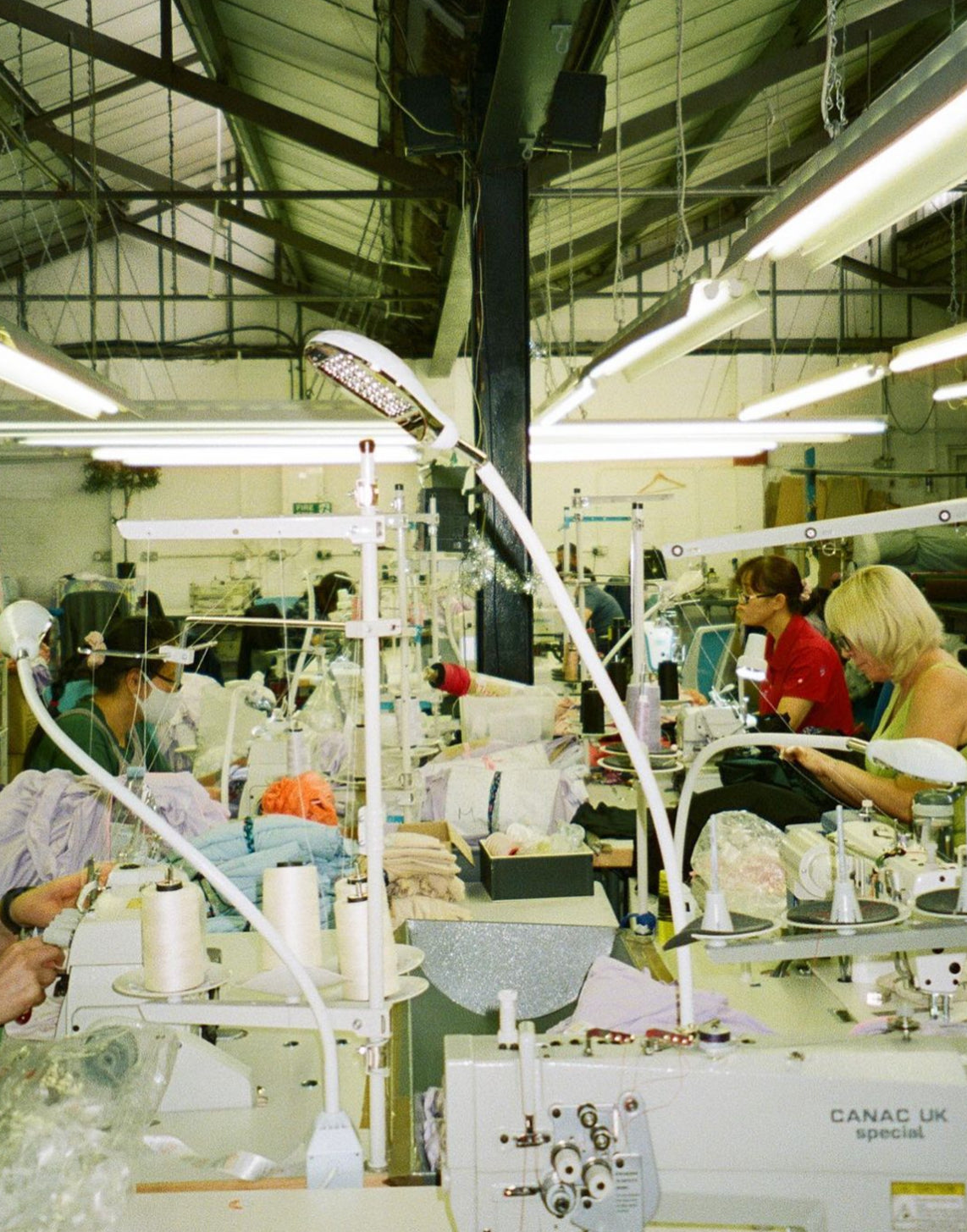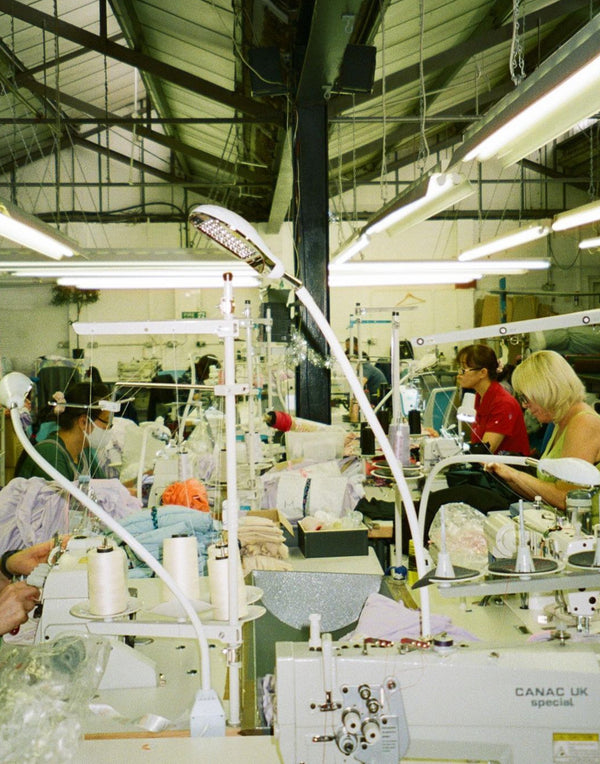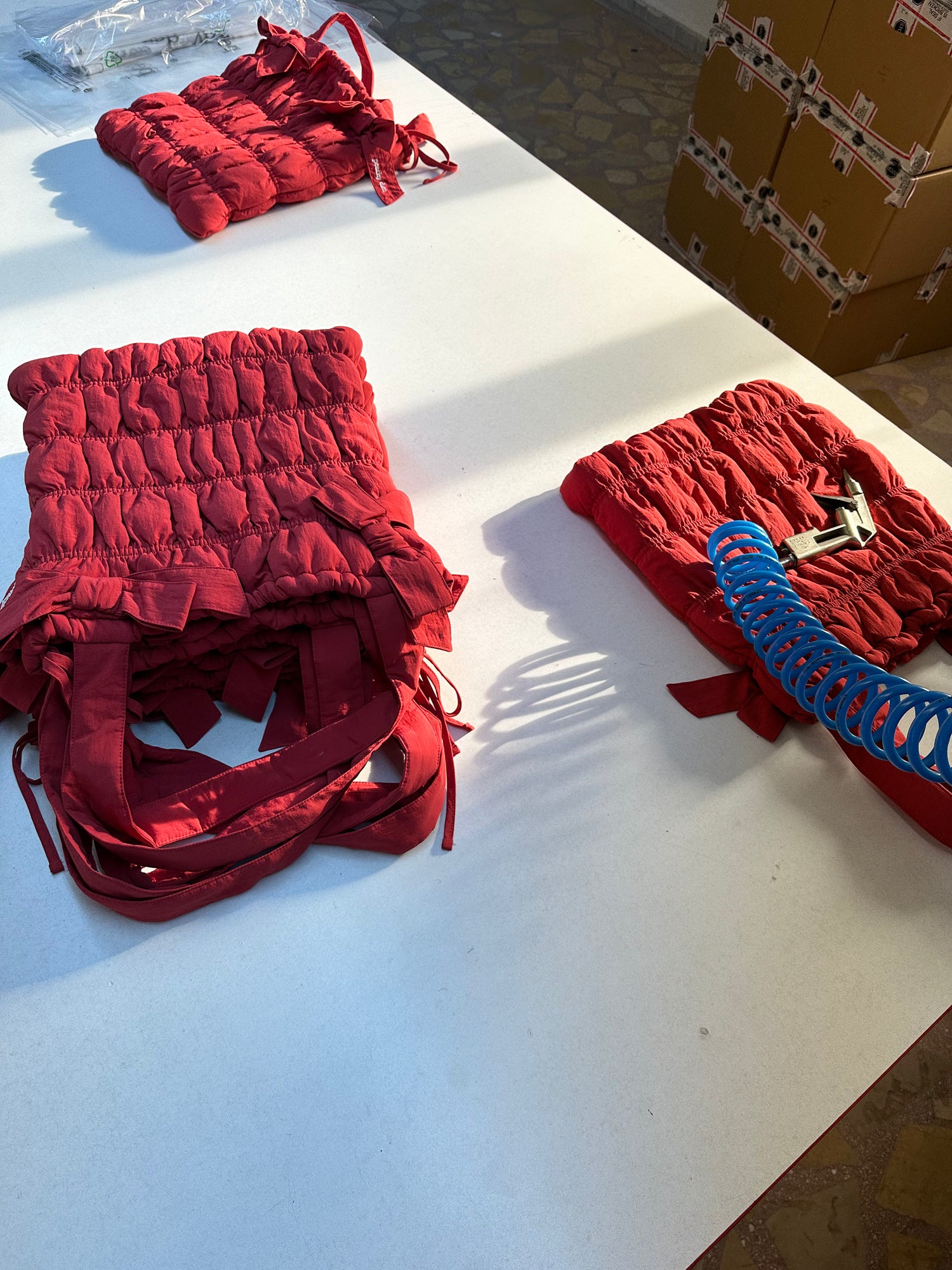Responsibility
At Peachy Den, we believe in transparency and responsibility throughout our supply chain.
All of our factories adhere to the Peachy Den Supplier Commitment, a comprehensive document emphasising responsible production and workers' rights.
We carry out regular factory visits, audits are conducted by third-party companies and we maintain continuous communication to ensure compliance.
WHERE WE PRODUCE & DETAILS OF FACTORIES
-
Factory Information
- We trust our suppliers but validate through audits and statutory pay verification.
- We visit our factories biannually in Europe and frequently in London.
- Our commitment includes working with certified suppliers, ensuring adherence to modern slavery regulations.
- Our warehouse partner, Tupack, aligns with our sustainability goals and is a proud B Corp member.
United Kingdom
BALHAM, LONDON
A factory very close to our founder's heart, we have been working together since the very beginning of Peachy Den. This garment manufacturing studio specialises in samples and production runs for high-end and independent designers. A lot of our OG Peachy pieces are produced here, like the Kernel Jumpsuit & Billie Bag.
LEICESTER, UK
A family run business that specialises in the manufacture of knitted scarves and hats. Every process in the manufacture of knitted football scarves and hats is done in-house. They have been making and producing merchandise for football clubs for over 25 years, and we’re their first fashion brand client.
Turkey
ISTANBUL, TURKEY
Factory 1: We started working together in 2023. This technical textile manufacturer in Turkey provides high quality products to the worldwide markets and is GOTS and SedEx certified. We produce some of our Denim here.
Factory 2: A family run enterprise, small 24 hour factory that knits our peachy socks. dynamic producer, manufacturer and exporter of garment products situated in Turkey. They source high grade quality control material, manufactured into our finished garment product by their professional workers. Our peachy socks are produced here.
PORTUGAL
NEIVA
Founded in 1980 as a simple sewing service, this factory is now the culmination of almost 30 years of textile sourcing/manufacturing in Portugal. Our Jersey garments are lovingly developed by this BSCI, SEDEX and FWF approved company. We have been working together for almost three years now since we first launched the Kylie cupro group.
RORIZ, PORTO
Supplied with 100% renewable energy and producing 35% of their energy through their own solar panels, this factory is committed to sustainable practices and is GOTS certified.
GONDOMAR, PORTO
Founded in 1989, this garment production company operates between sourcing raw materials to high quality clothing manufacturing. Our bestselling Mimi bottoms and Lennox trousers are manufactured with this factory.
SANTO ADRIÃO, PORTO
Founded in 2002, the company is situated in Vizela, a municipality in Northern Portugal. Specialising in the clothing industry, their core values revolve around ensuring both customer and employee satisfaction.
Hong Kong & Paris
TRIMS
Where we get all of our trims made. Specialist in labelling products for ready-to-wear, leather goods and underwear brands with offices in Paris and Hong Kong.
China
HANGZHOU
Founded in 1996, this factory is a leading manufacturer of sweater and jersey knit. They have been engaged in sweater ODM production for more than 20 years as a vertically integrated company. We started working with this factory in 2023 and our Gabrielle & Elsa knits are developed and produced here. The high quality production means the pieces are long lasting. We opt to ship by boat to reduce our carbon footprint.
FACTORY TESTIMONIALS



CRIS (LONDON)“We started working with Peachy Den in late 2018, and in 2019 Issy designed the very famous Kernel Jumpsuit which has been featured in most of the newspapers in the UK. It's always a privilege to work with Peachy Den and Issy because I have worked with many other companies in my time, and Peachy Den is my favourite company to work with. Our favourite style we have produced is the Kernel Jumpsuit - because we mastered the way to work with it. I have been in the fashion business for 43 years and in our business it is very unusual to work with honest, polite and respectful people, and the Peachy Den team are always very nice to work with.”
TERESA (PORTUGAL)“We have been working with Peachy Den since April 2022. We really liked the (Cindy) seersucker program because of the characteristics of the fabric, colours and fitting as well as the details. Working with Peachy Den has been very gratifying both in terms of personal relationships and in terms of the different products we develop together.”
YIGIT (TURKEY)“We started working with Peachy Den just last year, but I believe in long term business relationships and I really hope that we continue building our partnership for many more years to come. Our favourite product we have produced for Peachy Den so far is our very first order, which was The Robyn Puffer Jacket. I was very excited for us to start with one of the most complicated styles in the Peachy Den product range. It is very important and precious for us that Peachy Den trusted us and gave us that order. We believe that this order helped us to open a door being a business partner with Peachy for future orders.”
Embracing Responsibility: Our Commitment to conscious production
We prioritise mindful production, partnering with top-tier suppliers across Europe and China to ensure the highest standards.
Our dedication to corporate and social responsibility is unwavering as we work closely with our suppliers to uphold transparency in the global supply chain.
Responsibility is at the core of everything we do in garment manufacturing, acknowledging our impact on the environment, communities, and stakeholders. Here's how we're making a difference:
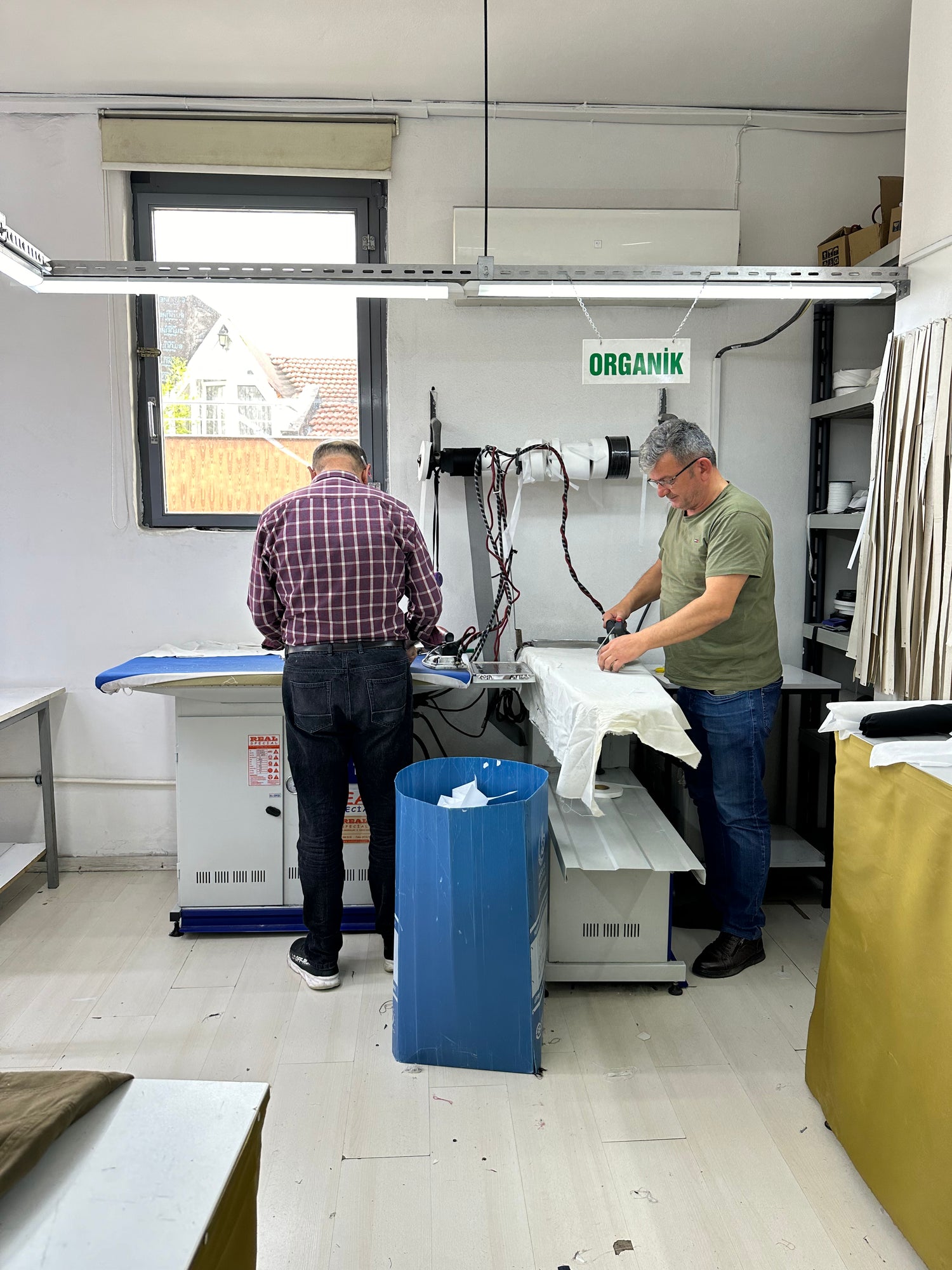
Environmental Responsibility
- Waste Management: We implement comprehensive strategies for waste reduction, reuse, recycling, and safe disposal, opting for sustainable packaging materials to minimise single-use plastics.
- Renewable Energy: We actively seek manufacturing partners utilising renewable energy sources to reduce reliance on fossil fuels and strive for carbon neutrality.
- Responsible Sourcing: We prioritise sustainable and eco-friendly materials, giving preference to those with third-party certifications for compliance with recognized environmental and social criteria.
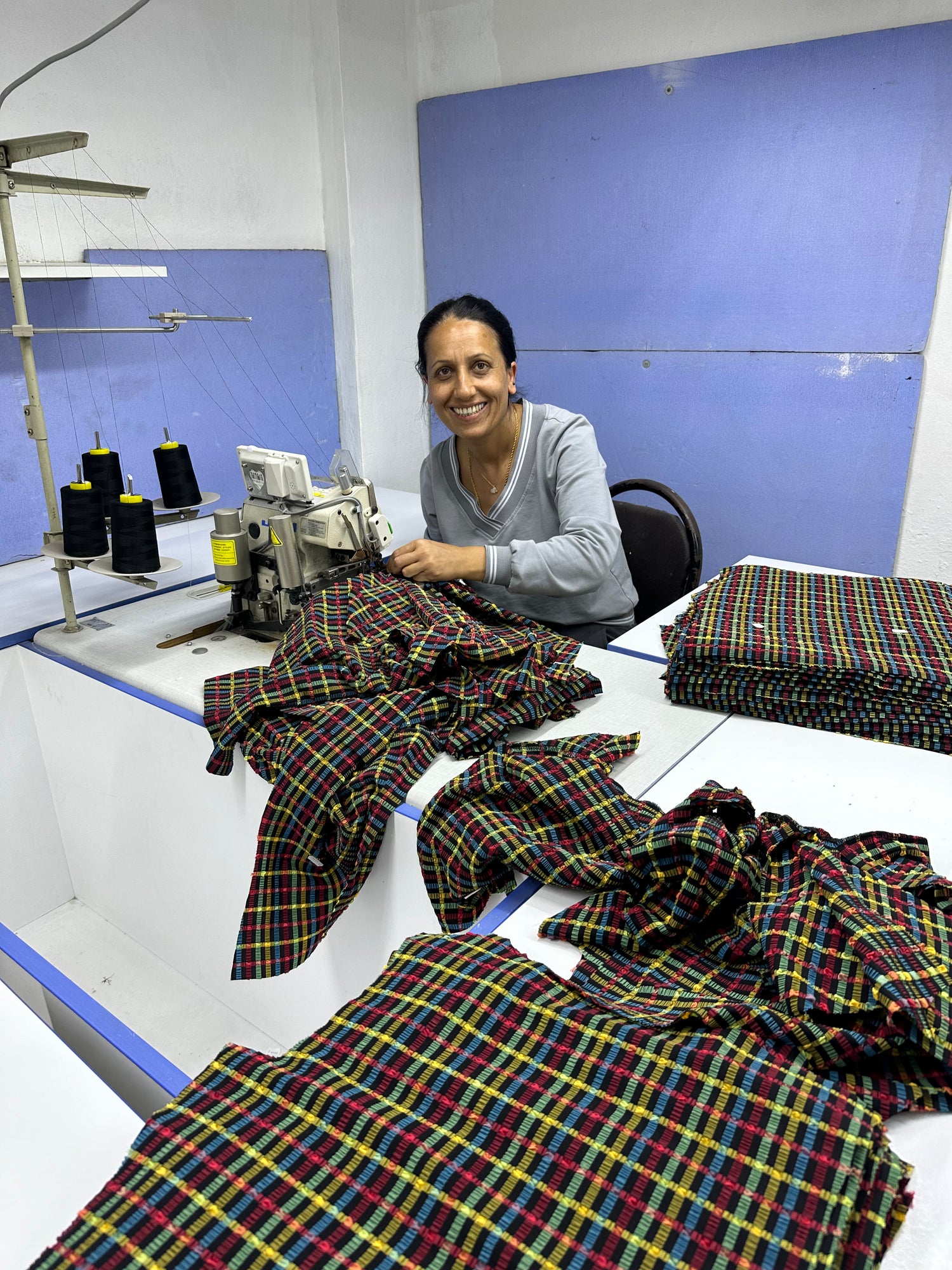
Ethical and Social Responsibility
- Worker Rights: We partner exclusively with manufacturers committed to upholding workers' fundamental rights, including fair wages, safe working conditions, and freedom from discrimination, child labour, and forced labor.
- Supply Chain Transparency: We promote transparency and traceability throughout our supply chain, collaborating with suppliers to ensure ethical sourcing practices and adherence to environmental and social standards.

Continuous Improvement and Collaboration
- Innovation and Research: We invest in research and development to advance sustainable technologies, materials, and manufacturing processes, striving for continuous improvement in environmental performance.
- Stakeholder Engagement: We engage and collaborate with employees, customers, suppliers, and other stakeholders to foster a culture of sustainability and identify opportunities for positive change.
- We’re proud to be partnering with BFC Solutions as part of our commitment to reducing carbon emissions and building greater transparency throughout our operations.

Responsible Collaborations
We are always considering and adopting new initiatives to help extend the life cycle of our products.
- Recycle: We annually offer our customers the opportunity to recycle their old Peachy products in exchange for discounts on new items.
- Rewear: We have hosted Swap Shops, enabling our community to exchange old Peachy items for pre-loved selections from our store.
- Rent: We have proudly collaborated with rental platforms like Hurr and By Rotation to offer managed rental opportunities, reducing environmental impact.
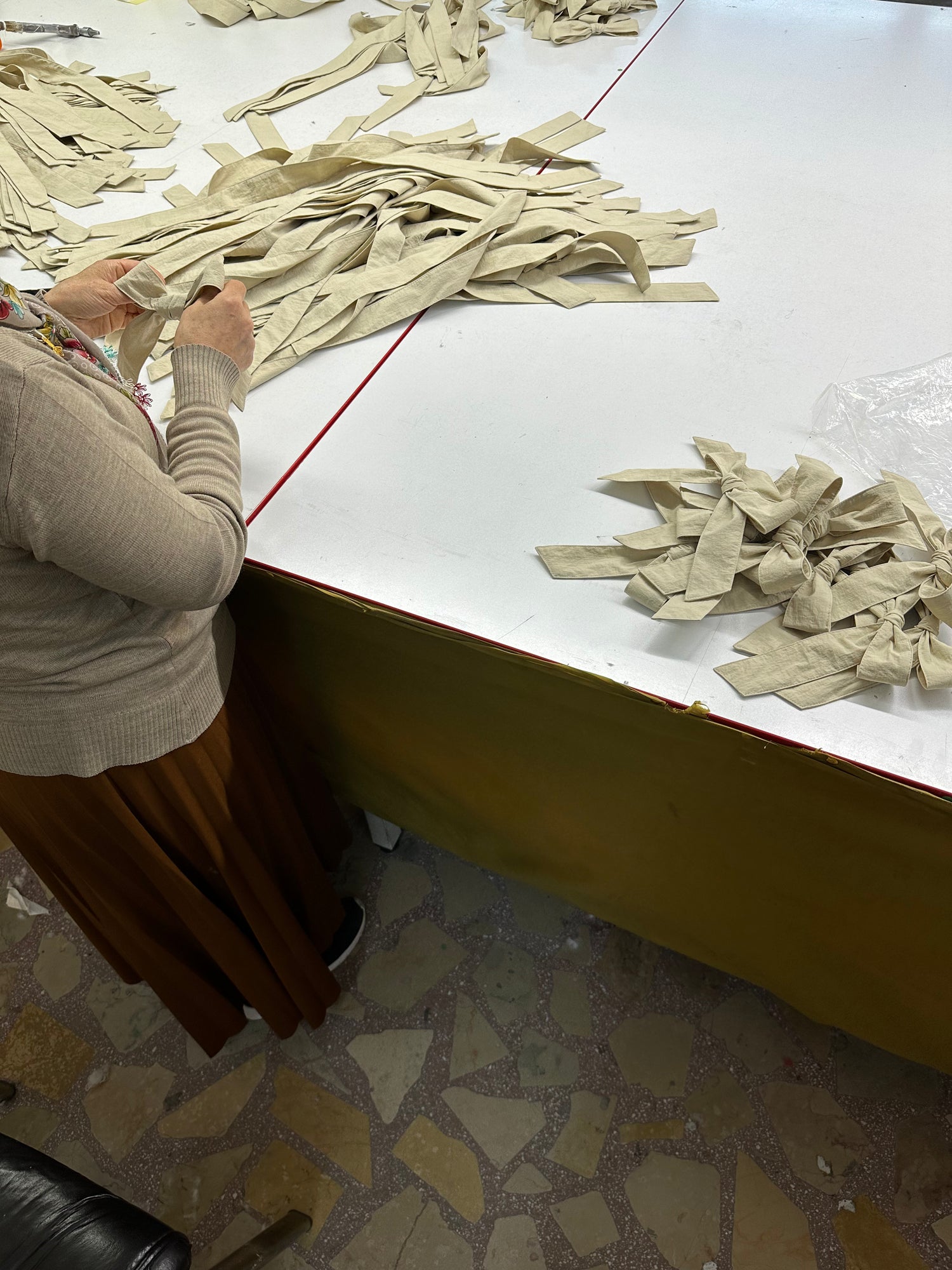
More Deadstock, Less Waste:
Our ‘Deadstock Drops’ were created in the spirit of reducing landfill waste. Leftover fabrics are matched with our best-selling patterns to create one-of-a-kind pieces we know you’ll love and wear. We've transformed pre-consumer fabric offcuts into capsule collections, like our super-sized scrunchie made from our deadstock Cindy fabric in collaboration with Goodsquish. Our bestselling Lennox trousers have been released in limited deadstock colourways like Lead, Blueprint and Granite.
Our "Peachy Preserves" projects are all designed, developed, and manufactured in house, keeping our design and development teams closely involved with the production process allowing a perfect opportunity to assess how we can apply conscious practice found in one off pieces into our to larger production runs, as well as inspiring creativity and individuality. Our ‘Heirloom’ capsule collection featured garments made from upcycled mens shirts and second hand doilies. Our design team consistently strives to find new ways to breathe life into fabric and garments that would otherwise be destined for landfill.
Our sustainability policy is dynamic, subject to regular review and updates to align with advancements in sustainable practices and stakeholder expectations.
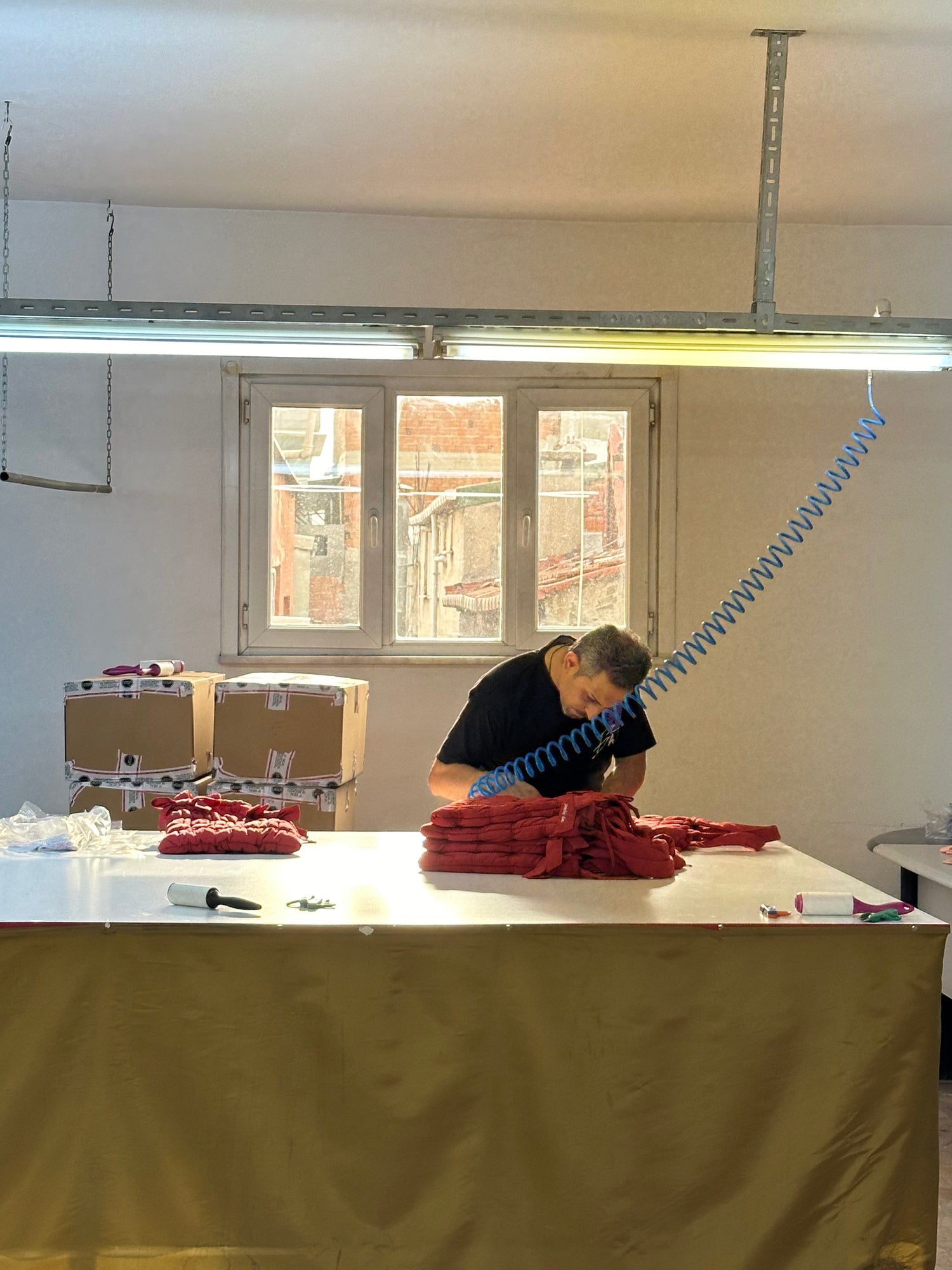
LONGEVITY
We believe that Peachy pieces are for life, and responsible garment care is key to preserving each piece. The way you wash, dry and store your clothing can have a huge impact on its lifespan, so we want to provide you with clear information on how to look after each piece. That’s why each garment has its own care label sewn in, and we provide detailed care guidance by fabric in order to maintain the durability and longevity of our pieces.
responsible garment care methods
Here are some of our recommended responsible garment care methods:
- Spot wash or sponge clean any marks or stains to reduce the need for frequent washing.
- Embrace re-wearing your items as often as possible before washing them, helping to conserve water and energy.
- When washing, opt for a cool or 30-degree quick cycle in the machine to minimise energy consumption.
- Say no to tumble drying and instead choose air drying to preserve the fabric and reduce carbon footprint.
- Consider using guppy bags during machine washing to capture microfibers and prevent them from polluting waterways.
- Look for green dry cleaners in your area to minimise exposure to harmful chemicals.
Garment End of Life Care
We're passionate about promoting the circular fashion economy, and we encourage you to consider the following options for your garments when they reach the end of their lifecycle:
- Resell your garment to give it a new life with someone else who will love and cherish it.
- If donating, ensure your piece is clean and in good condition to maximise its potential for reuse.
- Recycle damaged garments at a local textile recycling centre or drop-off point to divert them from landfills and promote sustainable practices.


